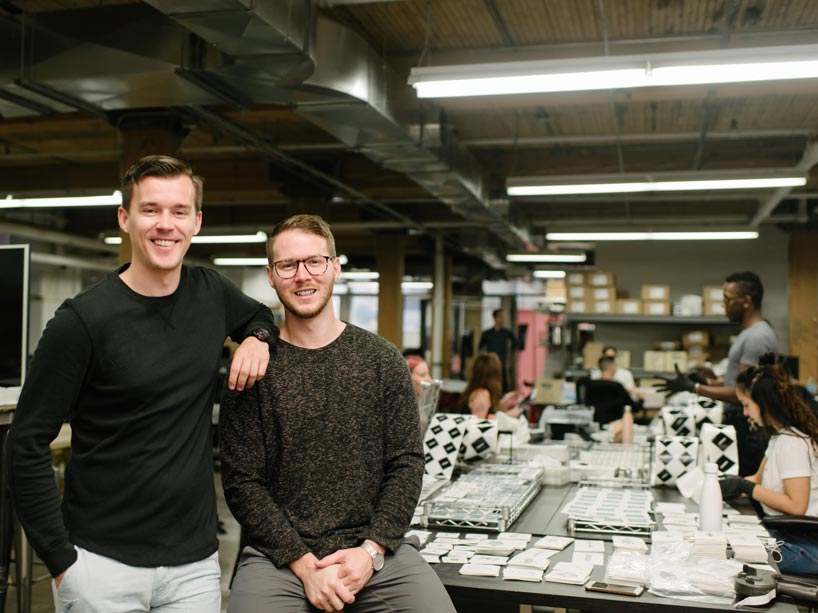Rotman Prof Talks Gender Equality and More – Toronto News

Toronto’s finest business schools have been doing their part to improve the landscapes of work environments and executive education. We’ve laid out this week’s highlights below.
Companies Find One-Stop Shopping for Executive Education – The Globe and Mail
Western University Canada’s Ivey Business School recently launched The Ivey Academy, a full-service learning and development center for executive education. This is good news for companies like Bruce Power LP, as they have been partnering with Ivey for years on leadership development education. Now, Ivey can also offer them services like corporate retreats and talent assessments.
“It would be nice to be able to [undertake executive education] with someone who knows us really well and knows a lot of our leaders really well and knows what our issues are,” says Cathy Sprague, Bruce Power LP Executive VP of Human Resources.
“We’re not the experts at everything,” Mark Vandenbosch, Dean of Ivey Business School, says in a recent interview in The Globe and Mail. “So … let’s figure out who are the people that we believe are up to the standards that we preach…so that when you put the parts together it’s more of a journey than a set of interactions.”
You can learn more about The Ivey Academy here.
Gender Equality In the Workplace: How Men Can Move the Needle – The Telegraph
Sarah Kaplan, Director of the Institute for Gender and the Economy and Strategic Management Professor at University of Toronto’s Rotman School of Management, interviewed two executives about the role of male executives in increasing workplace diversity (specifically, gender).
Kaplan spoke to Richard Nesbitt, President and CEO of Global Risk in Financial Services and adjunct professor at Rotman, and Kevin Lobo, Chairman and CEO of Stryker Corporation, and Director on the board of Parker Hannifin. The executives agreed that creating resources for women and determining their needs in the workplace is essential to creating an inviting environment.
“It’s important to have an official women’s network with an executive sponsor,” Lobo says. “I would advise people to put a thoughtful structure behind the initiative, give it a budget and empower people to run it effectively.”
Lobo emphasized that this course of action was a game-changer for Stryker. Stryker now has a mentorship system, so that women in the company have someone to talk to about their career path.

Sarah Kaplan, Rotman School of Management professor and Director of the Institute for Gender and the Economy.
“In academia,” Kaplan writes, “there’s a concept called ‘belonging uncertainty’: If you’re in an environment where you’re not sure that you belong—for example, if you’re a woman working in capital markets—you’re constantly looking for signals that you do belong.”
You can read more from Kaplan’s interviews on workplace gender equality here.
20-Years-Old, 20 Percent Down On A House. It’s Possible – The Globe and Mail
The Globe and Mail recently dug into the housing market, citing the story of a 20-year-old man who saved enough money to buy himself a house; a modern rarity. The man is an exception in the Canadian market, where the average price of a home is $475,000 CAD, and obtaining a mortgage is increasingly difficult. Moshe Milevsky, Finance Professor at York University’s Schulich School of Business, weighed in on Gen Y’s housing issues.
“People have to twist themselves into a pretzel to get themselves into houses,” Milevsky says. The article recommends utilizing options like the Home Buyers’ Plan, which lets buyers withdraw a certain amount from their registered retirement savings plan (RRSP) with 15 years to repay it.
Check out the rest of the article here.
New Yorker Cites Rotman Professor in Nobel Story – Toronto News

This week, representatives from Canada’s best business schools have utilized their skills and knowledge to make valuable contributions to the greater community. We’ve laid out the highlights below.
The Nobel Committee Honors The Economics of Market Failure – The New Yorker
A recent New Yorker article about the 2018 Nobel Prize in economics winners cites the blog of University of Toronto’s Rotman School of Management Professor Joshua Gans. Though the Nobel winners, Bill Nordhaus and Paul Romer, have not collaborated with one another, both have independently highlighted possible flaws and oversights of market economies. The article utilized Gans’s insight that the work of both winners provided a framework for economists to analyze and account for market failures.
According to thearticle, “In an idealized competitive market, prices equate the costs of producing goods with the benefits derived by consumers, and this equalizing mechanism insures that markets allocate resources and goods more efficiently than government diktat or other methods.”
Nordhaus’s research on fossil fuels and Romer’s research on goods that demonstrate advances in human knowledge suggest gaps in this narrative. Nordhaus’s work addressed that the cost of fossil fuels does not account for the damage incurred by their use, and consequent cost for future generations. This negative cost, importantly, is not accounted for in market transactions. Romer’s work explored positive spillover that is not accounted for in market transactions, such as advances in technology.
On news of Romer and Nordhaus’ awards, the Nobel Committee says:
“Both Romer and Nordhaus emphasize that the market economy, while a powerful engine of human development, has important imperfections and their contributions have thus offered insights into how government policy could potentially enhance our long-run welfare.”
You can read more about the Nobel Prize winners here.
Ryerson University Names Janice Fukakusa As Its New Chancellor – Newswire
Ryerson University has announced that Janice Fukakusa will take over as its Chancellor. Fukakusa, who received her MBA from York University’s Schulich School of Business, held senior roles at Royal Bank of Canada, including Chief Administrative Officer and Chief Financial Officer. She is currently on the board of not-for-profits like General Growth Properties, The Princess Margaret Cancer Foundation, and Cineplex. Until recently, Fukakusa was Chair of the Board of Governors for Ryerson. Fukakusa will be Ryerson’s first female Chancellor.
In her 31-year career, Fukakusa has received a variety of accolades celebrating her achievements. American Banker named her one of “The 25 Most Powerful Women In Banking” in 2016. She was also inducted into Canada’s Most Powerful Women Hall of Fame.
On news of her new role, Fukakusa says;
“I am honoured to be Ryerson’s new Chancellor, and look forward to driving the positive educational and societal changes for which the university has become known. We are leading the charge on so many important issues, and I am eager to work with students, faculty and staff in this new capacity to further advance the impressive progress that has been made to date.”
You can find out more about Fukakusa and her new role here.
Competition for Great Talent Has Become ‘Intense’ Axonify CEO Says – The Globe and Mail
The Globe and Mail profiled Carol Leaman, Chief Executive Officer of Axonify Inc. to highlight struggles facing tech employers. Leaman, whose company provides training modules for employees of corporations like Walmart and Bloomingdales, expressed that it has been increasingly difficult to woo qualified tech candidates. Amazon, Uber, and other global companies have been infiltrating the Ontario market, employing massive numbers of developers and IT personnel. Moreover, companies like Terminal have been helping U.S. firms hire Canadian developers.
/arc-anglerfish-tgam-prod-tgam.s3.amazonaws.com/public/YG6KDN4TFRGCBFLOFIYVYVVGOE.JPG)
Carol Leaman, president and CEO of Axonify / Photo via The Globe and Mail
According to Wilfrid Laurier University Professor of Organizational Human Behavior, Chet Robie, Leaman needs to offer stellar benefits and compensation in order to thrive.
“I would start working on making their compensation more competitive—and by doing that you don’t always have to increase base salary,” Robie says, alluding to benefits like work flexibility and upward mobility.
“What really resonates with this group of people doesn’t have to break the bank.”
Read more about competition in Canada’s tech market here.
DeGroote Introduces New Faculty, and More – Toronto News

This week, Toronto business schools have welcomed new faculty, promoted existing faculty, and been cited in popular publications. We’ve given a brief overview below.
The Innovators: DeGroote Welcomes Teresa Cascioli, Alfredo Tan as Industry Professors – McMaster News
McMaster University’s DeGroote School of Business has added two new professors to strengthen the school’s commitment to nurturing innovation and entrepreneurship. Professors Teresa Cascioli and Alfredo Tan have committed to a three-year term at the school.
Both Cascioli and Tan have joined the Strategic Management faculty. Cascioli will specialize in entrepreneurship, whereas Tan, a former Facebook executive, will specialize in digital transformation.
Cascioli, who graduated from McMaster in 1983, has long been involved with its growth. In 2008, she won the Wayne C. Fox Distinguished Alumni Award. She has donated upwards of $6 million to the school since graduating. Len Waverman, the Dean of the DeGroote School of Business, says:
“Teresa is someone who’s had great success in business, and she’s still succeeding. She’s a noted entrepreneur, and as we’re pushing more into the innovation and entrepreneurship space, it will be great to have her expertise on hand.”
Though Tan’s path to the field of digital innovation was far from straightforward, he has established himself as a valuable force. According to Len Waverman, Tan, “… is on the frontier of digital innovation, and that helps us be on the frontier as well.”
You can find out more about the new professors here.
How Leaders Can Get Better At Using Data to Make Decisions – Forbes
Forbes recently highlighted an article from the fall issues of Rotman Management—the University of Toronto’s Rotman School of Management‘s official magazine—discussing the misconception that increased reliance on data analytics to justify business actions has lead to less biased decision-making.
In the case study, Data Analytics: From Bias to Better Decision—which first appeared in the HBR Guide to Data Analytics Basics for Managers—Megan MacGarvie and Kristina McElheran argue that bias is still a major concern, even when data is informing the decision.
The co-authors laid out a few common cognitive traps that decision-makers often fall into. For example, “The Confirmation Trap” occurs when a decision-maker pays more attention to data that aligns with their expectations or existing beliefs. Understanding these cognitive traps may help organizations execute decisions that are truly informed by data analytics, rather than bias.
You can read more about the research here.
Schulich Professor Peter Macdonald Appointed Co-Director of Hennick Centre – yFile
York University has named Schulich School of Business Professor Peter Macdonald as the Co-Director of the Hennick Centre for Business and Law. After graduating from York’s Osgoode Hall Law School in 1985, York practiced law at multinational corporations, acted as a mediator, and eventually returned to York in 2001 to teach business law at Schulich.
On the announcement, Ed Waitzer, Director of the Hennick Centre for Business and Law, says:
“We’re very fortunate to have Peter join us as a co-director of the Centre. As co-director of the JD/MBA program, Peter already plays a key role in, and has made a huge contribution to, many of our programs and priorities. He’s a terrific resource.”
You can learn more about Professor Macdonald here.
BEworks Brings In Lazaridis, Schulich Alum David Lewis, Ph.D.

BEworks, a management consulting firm that applies behavioral science to consulting, has chosen David Lewis, Ph.D., as its Chief Client Officer. Lewis earned his Ph.D. in economics from the Lazaridis School of Business and Economics at Wilfrid Laurier University and an MBA from York University’s Schulich School of Business. The business scholar is optimistic about the opportunities ahead for the company.
“With almost a decade applying behavioral science to business challenges, BEworks is poised for tremendous growth, and I’m thrilled to be joining such a high-energy, passionate team of scientists,” Lewis says.
Though Lewis has held senior positions at companies like UBS Bank and Barclays, his most recent position has been as an Assistant Professor at Ryerson University’s Ted Rogers School of Management.
On Lewis’ new role, Kelly Peters, CEO and Co-founder of BEworks says:
“With his breadth of leadership experience and his scientific background, David [Lewis] will help us collaborate even more closely with our clients and introduce BE thinking to a broader range of organizations, further helping us bridge the gap between academia and business.”
“Organizations that embrace scientific thinking can embrace innovation and change faster, and take informed risks with confidence,” Lewis adds.
“With almost a decade applying behavioral science to business challenges, BEworks is poised for tremendous growth, and I’m thrilled to be joining such a high-energy, passionate team of scientists. Our upcoming Summit for Science in Financial Services in September is a testament to BEworks’ leadership in the behavioral science consulting space, as we convene the world’s best-known behavioral scientists to collaborate with business leaders from across North America.”
You can read more about BEworks and David Lewis here. In addition, you can learn more about the current BEworks projects here, with 20 operations across North America.
Rotman Prof Talks MeToo Movement, and More – Toronto News

Professors and alumni from Toronto’s top business schools have been making headlines this week. See what they’ve been up to below.
The Corporate Climb: Women Locked Out of Old Boys’ Club in Misguided Me Too Backlash – Canada’s National Observer
The MeToo movement began as a way to shed light on the pervasiveness of sexual assault and harassment following the allegations against Hollywood power-producer Harvey Weinstein. Ideally, the MeToo movement would lead to more accountability for people in positions of power, and consequently, better boundaries in working and personal relationships. Unfortunately, progress often comes with backlash, which may be the case in Canada’s business world.
Instead of increased education about harassment and consent, many workplaces have taken to diminishing their liability via actions that hinder women. Because of this, some men in upper-level positions shy away from mentoring women or being in more intimate situations with them (e.g. a client dinner, or a business trip). However, Sarah Kaplan, professor at the University of Toronto’s Rotman School of Management, feels strongly that focusing on the backlash of the movement is counterproductive to the cause. In Canada’s National Observer, Kaplan says:
“It is just one more way that even an effort to lead to more liberation and equality has been co-opted. It is as if people don’t understand what they shouldn’t be doing. As long as you don’t grab someone or proposition them, you can take someone to lunch … It is completely obvious how to be professional.”
You can read more about the reaction to the MeToo movement here.
Tattoo Company Fosters a New Kind of Art – Ryerson Today
Braden Handley, a Ryerson University’s Ted Rogers School of Management Entrepreneurship graduate, co-founded Inkbox with his brother Tyler in 2015. Since then, the business has recently accrued $10 million CAD in funding. Inkbox offers semi-permanent tattoos made with organic materials, that last around two weeks.

Braden Handley (left) with his brother Tyler / Photo via ryerson.ca
“Ryerson helped me get into work mode immediately,” Handley tells his alma mater in a recent interview. “You were taught how to be an employee … We were given a lot of assignments that were real work assignments.” The company employs 60 people, who contributing to the distribution of 60,000 tattoos per month.
“Chase your dreams, but your dreams have to align with your natural abilities as well. Everyone has predispositions and skills.”
Get more familiar with Handley’s journey here.
Top 100 Corporate Social Responsibility Influence Leaders – Assent Compliance
Assent Compliance’s new list of the “Top 100 Corporate Social Responsibility Leaders” has arrived. The ranking analyzes those whose “efforts contribute to improvements throughout global supply chains, helping individuals and companies make a positive difference.”
The list includes notable people like Laura Chapman Rubbo, who helped create the human rights policy for Disney.
Dirk Matten, Professor at York University’s Schulich School of Business, lands 44th on the list. Matten, who holds the Hewlett-Packard Chair in Corporate Social Responsibility, serves as Schulich’s Associate Dean of Research.
Discover the full list here.
York Schulich Alum Designs for Meghan Markle, and More – Toronto News

Representatives from Toronto’s top business schools have been making the news this week. See what they’ve been up to below.
Canadian Designer Bojana Sentaler Goes Global After Meghan and Kate Made Her Coats Famous – Notable Life
Bojana Sentaler, graduate of York University’s Schulich School of Business, has attained enviable success in fashion design after both Kate Middleton and Meghan Markle were seen wearing coats from her collection. After years in the corporate world, Sentaler moved in a different direction, and decided to pursue her passion for design. Her business acumen was not wasted in her new field, as Sentaler quickly identified a need in Canada for outerwear that balanced elegance and warmth. She filled this need using alpaca fabric, which she discovered on a trip to Peru. In a recent interview, Sentaler said:
“There are some truly brilliant designers here in Canada, that deserve to be recognized on a global platform. But first our consumers need to support Canadian by proudly wearing Canadian, and our industry as a whole needs to support and recognize Canadian potential.”
Learn more about Sentaler’s journey here.
CMHC Moves to Make It Easier for Self-Employed to Get a Mortgage – CBC News
Traditionally, self-employed people in Canada have encountered more difficulty getting mortgages, making it much more complicated for them to purchase a home. However, the Canada Mortgage and Housing Corp. (CMHC) has made changes that will increase the flexibility of mortgage grants. Lenders can now use factors such as predictable earnings and previous training and education to justify giving a mortgage to someone who is self-employed.
Cynthia Holmes, Chair of the Real Estate Management Department at Ryerson University’s Ted Rogers School of Management, was optimistic about the changes, particularly insofar as they might help younger professionals lay down roots more quickly.
“This change could especially help young self-employed people access a mortgage more quickly, which supports innovation and entrepreneurship,” Holmes says to CBC News.
Learn more about the CMHC’s changes here.
All Work And No Play Can Make Us Less Productive, Research Shows – Australia Financial Review
A forthcoming study has demonstrated that long hours and stressful work have long-term negative impact on employees. The study (“Implications of work effort and discretion for employee wellbeing and career-related outcomes”) demonstrated that running employees ragged could have long term effects on their health and success.
According to the study, which was authored by Argyro Avgoustaki and Hans Frankfort, working more hours at a higher intensity does not enhance career prospects down the line. Efforts to protect the health of employees have generally emphasized shorter hours, but the study shows that controlling the intensity of the workload may actually be more important. Other researchers in the field have shown support for this perspective.
Erin Reid, associate professor at McMaster University’s DeGroote School of Business, co-authored an article with Lakshmi Ramarajan, assistant professor at Harvard Business School, for the Harvard Business Review. According to the article, “Valuing work time over work product—which motivates people to deceive others about how many hours they’re clocking—is an easy trap to fall into, especially for professionals, whose knowledge-based work is difficult to evaluate.”
Read more about the new research here.
